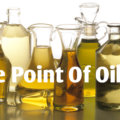Olive oil – is a liquid fat obtained from olives, a traditional tree crop of the Mediterranean Basin. It is commonly used in cooking, whether for frying or as a salad dressing. The health benefits of olive oil are unrivaled, and research reveals more benefits nearly every day. In fact, we are only just beginning to understand the countless ways olive oil can improve our health, and our lives. The health benefits of olive oil include treatment of colon and breast cancer, diabetes, heart problems, arthritis, and high cholesterol. It also aids in weight loss, improves metabolism, digestion, and prevents aging. It is a staple ingredient for many culinary preparations and also serves a variety of medicinal purposes.It also helps in lowering the bad cholesterol levels in our blood, as it is rich in monounsaturated fats. The extra virgin olive oil variety contains the highest level of antioxidant polyphenols and oleic acid. It is thus a healthier option compared to other vegetable oils.
However, all this wonderful health benefit of olive oil are often lost when heated to or above smoke point. As the name implies, smoke point is the temperature at which the fat or oil begins to smoke. Smoking is evidence of the fat’s breakdown due to heat and can create a very off-putting smell and flavor. This breakdown result in the release of trans fat, free radicals and toxins that often get into your food and consequently lead to various health problems.
The Smoke Point Of Various Quality Of Olive Oil
| Type | Quality | Smoke Point °C | Smoke Point °F |
| Olive oil | Virgin | 210°C | 410°F |
| Olive oil | Extra virgin, low acidity, high quality | 207°C | 405°F |
| Olive oil | Extra virgin | 190°C | 374°F |
| Olive oil | Extra virgin | 160°C | 320°F |
| Olive oil | Refined | 199-243°C | 390-470°F |
Products Of Oil Smoking What You Should Know About Them
The breakdown of oil result in the release of trans fat, free radicals and toxins. Here is what you need to know about the health implications of this byproducts of smoking oil:
Trans fats – Raise your bad (LDL) cholesterol levels and lower your good (HDL) cholesterol levels. Eating trans fats increases your risk of developing heart disease and stroke. It’s also associated with a higher risk of developing type 2 diabetes.
Free radicals -Can disrupt cell membranes, increase the risk of many forms of cancer and damage the interior lining of your blood vessels, leading to a higher risk of heart disease and stroke.
Toxins – According to researchers released toxins could increase dieters’ oxidative stress and their risk of developing serious conditions, including hormone (endocrine) disruption (reproductive and fertility problems), heart disease, cancer, Alzheimer’s disease and Parkinson’s disease.





